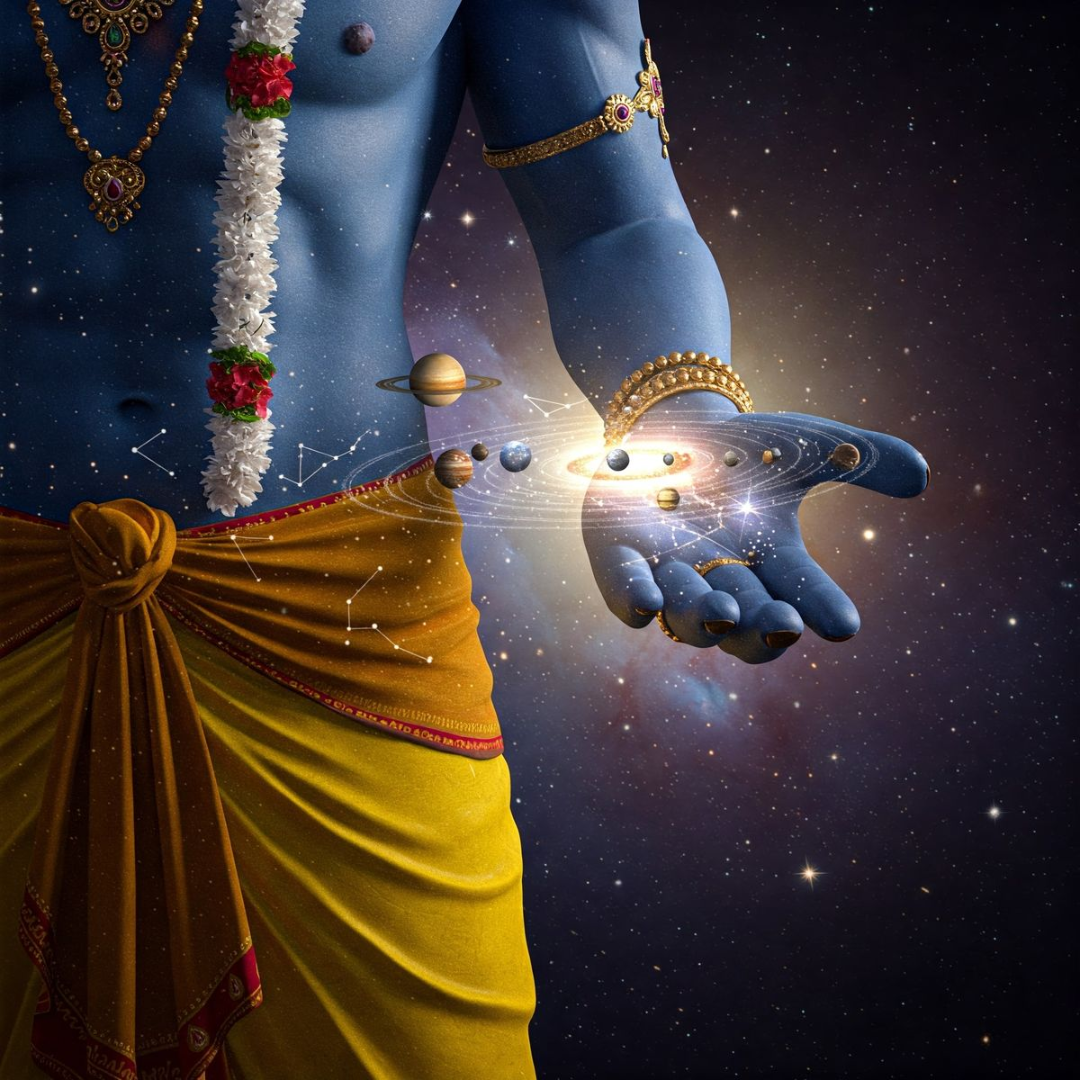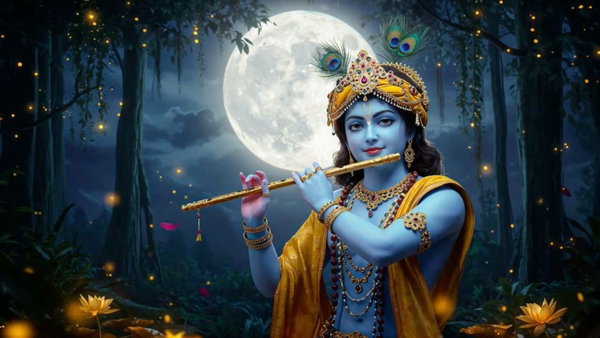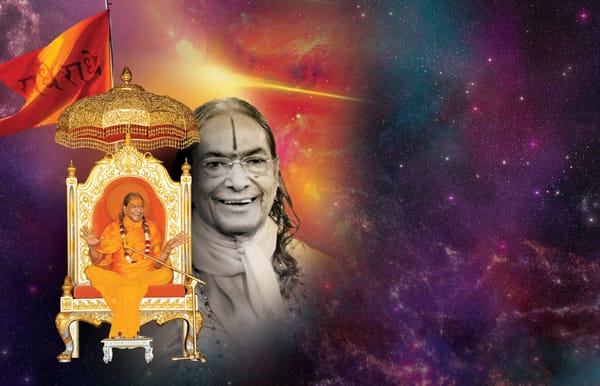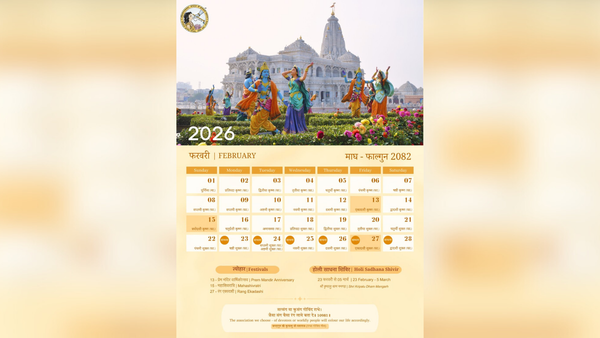Daily Devotion - Sep 12, 2025 (English)- Narad Bhakti Darshan - Part 4

Nārad Bhakti Darshan - Next Part
So far, Shri Maharaj Ji has explained the first five sutras of Nārad Bhakti Darshan.
Now he is explaining the sixth sutra:
Sutra 6 - Yajjñātvā matto bhavati stabdho bhavati ātmārāmo bhavati
(i) Yajjñātvā - Upon knowing Whom, a soul becomes a saint, a devotee.
(ii) Matto bhavati - he becomes intoxicated,
(iii) Stabdho bhavati - becomes peaceful, and
(iv) Ātmārāmo bhavati - becomes ātmārāma (self-content).
Let us first understand Yajjñātvā.
(i) Yajjñātvā - In sutra 4, Nārad Ji said 'yallabdhvā', meaning "upon attaining Whom." Attaining God and Bhakti - these are matters of the final stage.
Now he says - yajjñātvā, meaning "upon knowing Whom."
Many people say, "All these scriptures and Vedas speak of God. What does it matter to us?" But thinking this way is being naïve. It matters greatly. Without this, your sādhana may rise, but it will fall again.
Tattvajñāna (philosophical knowledge) is paramount -
siddhānta baliyā citte na kara ālasa
Gaurānga Mahāprabhu says: "Do not be lazy in acquiring philosophical knowledge. Also, keep it with you at all times. Otherwise - 'tattvavismараṇād bhekīvat'.
Only when you constantly remember it can you face your enemies. Even after Shri Maharaj Ji explained thousands of times, we forget tattvajñāna because we do not contemplate upon it.
Gaurānga Mahāprabhu said something so profound about tattvajñāna that you will be amazed to hear it. Someone asked him, "Please describe the characteristics of a Guru. What is his best quality?"
The scriptures and saints have described various qualities, but Gaurānga Mahāprabhu told Sanātan Gosvāmī the characteristic of a Guru in one line:
Jei kṛṣṇatattvavetlā sei guru haya
One who 'knows' the entity Shri Krishna is a Guru. He said 'knows' - he did not even say 'has attained.' - such is the importance of tattvajñāna.
If tattvajñāna always remains with you, then you cannot commit sins. As soon as any impure thought arises in the mind, you will think, "Shyamasundar is taking note of all my thoughts, and I want His grace. The Guru is also taking note, and I want his grace - yet I was about to commit this offense by deceiving and keeping things from them, maintaining privacy." If you remember tattvajñāna in this way, you will become careful.
Otherwise, you often tell each other, "Hey! Don't tell Maharaj Ji." What does this mean? It means, "These are our private matters between us. They should not reach the spiritual government."
dvau niṣadya yanmantrayete tadrājā veda
All the privacy you maintain is noted there. You can have no privacy.
So tattvajñāna is a very important thing. Understand it very deeply. If someone dies having become tattvajña (the one who knows philosophy), he has accomplished a great feat.
What is tattvajñāna?
- Tattvajñāna does not mean that you merely remember whatever you heard. Having firm conviction, faith, and belief that "it is indeed so" - this alone is tattvajñāna.
"God is omnipresent" - this is a fact, but you do not have this faith. The moment this realization arises that God is everywhere, your work is done -
astītyevоpalabdhasya tattvabhāvaḥ prasīdati
You may remember the words, but you forget them at the crucial moment. Why? Because after hearing tattvajñāna, you do not practice contemplating upon it. Due to carelessness, you forget it.
A saint said - krodhaḥ krodhe kathaṁ nu te
Do not be angry with anyone. Be angry with anger itself.
If you remembered this line as soon as anger arose, you would become normal. Even at the time of committing the greatest offense, by coming into contact with worldly people, you refrain from it. So if you realized God as omnipresent, then the question of committing an offense would not arise. There is no question of doing something wrong, because you have self-interest - you want His grace.
So tattvajñāna is absolutely essential. Do not be careless about it. Do not underestimate its importance.
- Tattvajñāna also does not mean all this - what is prakṛti? What is mahān? What is ahaṅkāra? What is pañcatanmātrā? What are pañcamahābhūta? What are rāga-dveṣa and abhiniveśa? And so on.
- Tattvajñāna is only three things -
vedaśāstra kahe sambandha, abhidheya, prayojana
kṛṣṇa, kṛṣṇabhakti, prema tina mahādhana
i) Sambandh - What is your relationship with Shri Krishna?
ii) Abhidheya - What should you do to fulfill that relationship?
iii) Prayojan - Why should it be done? What is your goal?
That is all. If these three tattvajñānas become established in you along with firm faith, then the firmer they become, the closer you are to God.
First, understand sambandh briefly.
i) The word sambandh is formed from sam (prefix) + bandh (root). Its meaning is samyak bandhan, a perfect bond - a bond from all sides - a complete bond, a one hundred percent bond. This is called sambandh.
In the world, you call your relatives sambandhi.
Now consider these two points -
- Can the word sambandhi apply to mother, father, son, wife, or husband?
- And can it apply to Shri Krishna?
Think over this and make a decision.
- First, take worldly relationships:
i) You call all your relationships in the world sambandhi because your self-interest is fulfilled through them.
ii) How long will these relatives remain with you? Their relation is so uncertain that there is no guarantee for even a moment. Today you have a father. After death, someone else becomes your father. Then a donkey becomes your father, then a dog, then a cat. In whatever species you go, there will be some father. In this way, you have had infinite fathers, infinite mothers, infinite wives, infinite husbands, infinite sons, daughters, brothers, and sisters - all -
kati nāma sutā na lālitā kati vā neha vadhūrabhunjihi
kva nu te kva nu tāśca vā vayaṁ bhavasaṅgaḥ khalu pāntha saṅgamaḥ
It is like the company of travelers. All travelers sit in a train, each going to their destination. During the journey, they converse with each other and agree on things. But when one's station comes, he gets off there. All the loving conversations that were happening till then ended. The account of all souls whom you call relatives - mother, father, son, wife, husband - is exactly like this.
iii) If by chance your parents and siblings remain alive throughout your life, they will remain your relatives only as long as they are favorable to you, fulfilling your self-interest. Otherwise, even brothers kill each other. In the morning, it seemed there was a relationship; by the afternoon, it had reversed, and abuse began. And the greatest truth is that the way you consider someone a relative for your own interest, he also considers you a relative for his own interest. And when both have self-interest, both speak loving words to each other. The love is for fulfilling their selfish motives. So this relationship is only outward. Inside, there is always conflict. People in this world survive only by acting. If all the facts came out, the world as a whole would collapse within twenty-four hours.
iv) And what will happen after death? After that, everyone goes to their respective destination according to their own karma - everyone has their own separate account. This means the relation is broken upon death.
Thus, in the world, no one can be your true relative.
Whatever relations you have in the world are not 'sam', they are only 'bandh'. Sam means 'samyak' - complete. How are these relations complete? And even during the short span of a few days, months, or years, people quarrel day and night. That is no relation at all.
Understand the order of worldly relations in brief:
- More well-wishing than a neighbor is a servant.
- More well-wishing than a servant is a friend.
- More well-wishing than a friend are mother, father, and children.
- More concerned for your self-interest and well-being than them is a wife or a husband.
These are all your worldly relatives. And your greatest relative is your body - your own body. You have the most attachment to your body, but even that body leaves you when the time comes. The body was formed in the mother's womb and must be left behind here.
This body is made of five gross elements. Upon death, it returns to them. It merges with its source - earth into earth, water into water, fire into fire, air into air, space into space.
This is a grand cyclical drama:
- Manure is made from the body and its waste.
- That manure is put into wheat and other grains.
- Then wheat is produced.
- Then you eat it.
- Then it forms a nutrient-rich liquid, followed by blood, flesh, fat, bone, marrow, and then semen.
- Then, from the father's semen and the mother's ovum, the child's body is formed.
- That body ends and merges into the same earth again.
Then one consumes that food, and again semen is formed from it. This cycle has been continuing. This is the state of the body. How can this poor thing be someone's relative? And even within it, there are so many problems. Today, there is pain in one place; tomorrow, there is pain in another. You must take care of it, visit the doctor. You serve it like a slave yourself. What welfare will it do for you?
Therefore, no one in the world is your true relative. And the greatest truth is this - the one from whom you seek welfare, happiness, and benefit, that poor soul does not even know what welfare is. So what welfare will he do for you?
(to be continued...)
Recommended books by Jagadguru Shri Kripalu Ji Maharaj related to this topic:





